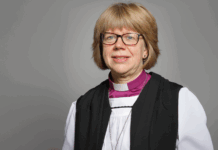The text of the sermon preached by Archbishop Thabo Makgoba at a Christmas Eve Mass with Lessons and Carols at the Cathedral Church of St George the Martyr in Cape Town. The Archbishop began by thanking the Dean, staff and members of the Cathedral congregation for their faithful service during the pandemic. He continued:
Let me begin bluntly by saying that 2020 has been a lousy, unspeakable year for too many South Africans, and this Christmas – coming during a time of such intense suffering across the world – is not the Christmas we would have asked for. But it is the Christmas we have been given, and I invite you to reflect on the observation that it is probably the Christmas in our lifetimes which has the strongest resonance with the first Christmas.
Viewed from any angle, the Christmas narrative is one of dislocation and marginalisation. A young couple is forced to make an arduous journey to a place far from their home to comply with a political injunction. They face the shortage of suitable accommodation that is all too common for many young couples, especially those on the move. They are forced into appalling living conditions, shared with animals. And the birth of the Christ child, this strange and unprecedented but beautiful intervention of God in making all things new, is recognised, not by the powerful institutions in Jerusalem but by the most marginal of people, shepherds who were not regarded as ritually ‘clean’ enough to worship in the Temple.
The entire Christmas tableau is crowded with marginal people, all of whom moved, were displaced from their everyday situations, from their comfort zones to be unsettled by the reality of where God was at work. This is the back story of Bethlehem. It’s extraordinary, the angels left the heavens, Mary and Joseph left Nazareth, the shepherds left their flocks and the caves where they lived, and the Magi, strangers, unknown people from unfamiliar territory, left the East. Every one of them is embedded in a narrative of dislocation. There is a disruption in everyone’s routine, in their expectations and their securities.
So, amid the dislocation and disruption we have gone through, how do we balance the joy of Christmas with the trauma of the past year, surely one of the most traumatic we have experienced since 1994.
Let us step back and reflect first not on what has happened, but more importantly, ask: what did we learn about ourselves during this calamitous year that could make 2021 better? For myself, my engagements with communities and homes across Southern Africa, whether on Zoom or during the limited travel I was able to do, exposed me not only to the pain and suffering of others, but gave me something I have long prayed for but which I have only genuinely begun experiencing in the last three to six months, which is more resilience in the face of adversity than I had before. I dare say that this has been true for many of you, and for our society as a whole, enabling us, yes, to bend in the face of the pandemic, but not to break.
In this past year, my mind and heart have been flooded with the lives, hardships, challenges and resilience of everyone I have encountered: of South Africans I think of, cry with and pray for every day; and especially of fellow South Africans whose names and faces I will never forget, namely those who died without saying goodbye to their loved ones, those whose families are going hungry, those with struggles beyond their usual challenges; and those young Africans who have lost trust in the capacity of our society to provide equality of opportunity because they can’t find work.
The story of the pandemic is the story of illness, with nearly a million cases and more than 25,000 deaths in South Africa alone. It is the story of more than three million people plunged into unemployment in a country already riddled with unemployment. It is the story of an additional 1,4-million people furloughed, nearly 40 percent of whom never got their jobs back. It is a story in which those least likely to get their jobs back were black Africans. It is is the story of middle-class families unexpectedly losing their traditional sense of security and of new levels of poverty for the already poor. Perhaps most criminally of all, the story of the pandemic is one of corrupt people stealing shamelessly from resources which are meant to benefit the poor.
But, beautifully, the story of the pandemic is also one of self-sacrifice and dedicated service to others. It is one of nurses, doctors and other health workers working long hours, exposing themselves at great risk, to treat those who are ill. It is the story of those who, beyond the call of duty, sit with the dying when their families cannot be at their bedsides. It is the health scientists and civil servants who work around the clock to protect us and find new ways of fighting the virus. It’s those who attend to the long lines of people coming to fetch their social grants. And it’s the thousands of people who pack food parcels for those without, or sacrificially donate from the little they have to support others. In every corner of the country, people who are different in many ways have found solidarity in the search for the common good, motivated by noble ideals. People on the frontlines, people keeping us fed and clean, people protecting us in the streets, all showed great courage, solidarity and generosity of spirit, giving us an inkling of what social cohesion might look like in the days to come.
It is resilience which has empowered the best of our responses to the pandemic. Resilience enables us to respond to those challenging moments in life that can be ripe for change, innovation and transformational creativeness. As Pope Francis wrote recently:
“These are moments in life that can be ripe for change and conversion. Each of us has had our own ‘stoppage,’ or if we haven’t yet, we will someday: illness, the failure of a marriage or a business, some great disappointment or betrayal. As in the Covid-19 lockdown, those moments generate a tension, a crisis that reveals what is in our hearts.
“In every personal ‘Covid,’ so to speak, in every ‘stoppage,’ what is revealed is what needs to change: our lack of internal freedom, the idols we have been serving, the ideologies we have tried to live by, the relationships we have neglected.”
Thus it is that the crisis of the pandemic reveals to us that God is present in the very dislocation it spawns. It is precisely where God is at home. If Christmas is the new birth, then it is being born out of the vortex of disruption, amidst the cries and demands of the marginalised, the poor, the exploited, victims, survivors and the forgotten. It is in responding to their cries that we begin to sense the flicker of new life, the first stirrings of Christmas. God is asking us to find God in places that we would not normally consider.
Those of you who know me, know that I am one who is “hopelessly hopeful”. My hope is rooted not only in the knowledge of God’s goodness but in the expression of that fundamental goodness in the lives of people, as evidenced in the random acts of kindness we share and often experience. But mostly I experience hope in what I see as an unchallengeable, undeniable, indisputable and glorious South African resilience.
Sometimes, maybe more often than occasionally, it is easy to feel paralysed: there are so many places of apparently never-ending conflict; corruption continues even when we have booted the corrupt from power; the government tolerates the leeches whose response to Covid-19 was overcharging, price gouging and financially raping our country and our neediest; and our society seems continually blind to what I call the “inequality of equality,” the persistence of inequality despite our proclaimed commitment to equality.
And if we look at a wider canvas, we see in sub-Saharan Africa hundreds of thousands of refugees and migrants fleeing conflict, poverty, hunger, climate change and lack of opportunity. These tragedies may seem distant, part of the drum-beat of daily news that, sadly, fails to move us to change our priorities. But like the Covid-19 crisis, they affect the whole of humanity.
During these times, I find an emotional oasis in Scripture, in the weekday reflections that I have been doing online in recent months, and in the lessons from my grandparents and parents, whose lives were filled with daily struggle, lives characterised by self-sacrifice, lives well lived by harnessing an unbreakable resilience.
If we are to come out of this crisis less selfish than when we went in, we must let ourselves be touched by others’ pain. The pandemic has forced us to strip away many of the additions we have added on to Christmas. There is less money to spend, there are restrictions on social gatherings and we are being discouraged from travel. Maybe this Christmas we should stop focusing on self-preservation (the ME) and ask, “What can I do for my neighbour?” (the US). Perhaps we should focus on giving instead of getting; not giving material gifts bought in an atmosphere of feverish consumerism, but rather giving hope and practical help to the elderly, the unemployed, the disabled and the marginalised.
Finally, as a society we must seize the moment to rethink our priorities, to reconsider what we value and what we want to achieve. We need to think big, and commit to act on our dreams in our daily lives. We have already seen the benefit of thinking big, in the remarkably rapid development of Covid-19 vaccines. Now it is our moral duty to share our vaccine know-how in the world and to ensure that the vaccines must be for the public good and not for profit.
We cannot return to the false securities of the political and economic systems we had before the crisis. We need economies that give to all access to the fruits of creation, to the basic needs of life: to land, lodging and labour. We need to intensify our efforts to stand up to corruption and eradicate it from our political life. We need a politics that doesn’t pay lip service to the poor, but is truly in dialogue with the excluded and the vulnerable, and gives them a full say in the decisions that affect their lives. Above all, we need to slow down, take stock and design better ways of living together on this earth.
Covid-19 has shown us that Christmas is either about Emmanuel – God with us – or it’s about nothing. Archbishop Desmond used to tell the story of the Jewish concentration camp prisoner who was sent to work in the pit toilets. When a Nazi guard looked down into the pit and taunted him, “Where is your God now,” the prisoner replied quietly, “He is here with me in the muck.” God is with us in our fears about the future, with us in our uncertainties and vulnerabilities, with us in our disappointments, with us in our pain and mourning. God is with us as we patiently wait for answers to questions that loom impossibly large at this time; God is with us as we say with St Theresa of Avila, “even this will pass”; God is with us because that is the nature of God.
From my family to yours, Merry, Merry Christmas.
May God bless you, your family and South Africa.
Most importantly, remember: God loves you, and so do I.



